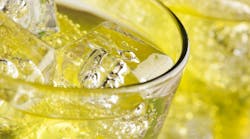Did you know that you may be damaging your teeth with sugar-free drinks? As a dental hygienist who has practiced more than 10 years, I can’t tell you how many times I’ve encountered bright, well-meaning patients who thought they were making healthy, responsible beverage choices, only to learn that they were encouraging oral disease.
This reminds me of a new patient several years ago. “Chris” came to our practice wanting a checkup and cleaning. He mentioned dark stains on a few of his front teeth, but other than that, he had no concerns. He was 22 years old with no health issues, and he described his daily oral care routine as brushing twice daily with an electric toothbrush, using fluoride toothpaste, and flossing most nights.
After taking x-rays and performing a thorough examination, the doctor and I discovered cavities. Not just a few small cavities; Chris had large areas of decay affecting all 28 of his teeth! The doctor and I were in disbelief as we had not expected to find this extent of disease in such a young, otherwise healthy person. While the doctor focused on creating a restorative plan for the active decay, I focused on learning what had caused Chris’s cavities so I could design a preventive plan for him.
Related articles
Though "calorie-free," sodas are not free
Lifestyle changes among dental patients can reduce the damage from an acid attack
As I asked about his diet, Chris confidently said, “I don’t eat sweets. I rarely have dessert, and I’m not a fan of candy.” I explained that many people forget that beverages are part of their diet, and I asked him what he drinks during an average day. He quietly said, “Well, I like diet soda. I’ve been working on cutting down the amount I drink, but I usually have six to eight cans a day. I used to drink regular soda, but I switched to diet because I know that the sugar-free version is healthier and won’t affect my teeth, right?”
What are acidic drinks and foods?
Many people have a basic knowledge of how diet influences oral health, but they don’t realize the dangers beyond sugar. But sugar is not the only dietary concern dental professionals have when it comes to risk for tooth decay. While most of us know that sugar feeds cavity-causing bacteria in the mouth, many are surprised that sugar itself does not cause damage to the teeth. Science shows that once sugar is consumed (carbohydrates), oral bacteria process it as their own fuel and release an acidic waste byproduct after the sugar has served its purpose.1 This acidic waste is what forms cavities, or holes, in the tooth structure.
If bacterial acid released from eating sugar can cause tooth decay, imagine how much more damage can be done with additional acids. Dietary acids come in many forms, from dairy to meat to grains. Our bodies need these acids to perform optimally, but like many things, it’s possible to overdo it. Eating a diet too high in acid causes the environment in the mouth to become acidic as well.
You may remember learning about the pH scale in science class in middle or high school, which is how we measure acids and bases. A high pH (above 7.0) means that more base is present, while a low pH (below 7.0) means that more acid is present. As an example, liquid drain cleaner has a pH of 14.0 and is extremely basic, while battery acid has a pH of 0 and is extremely acidic2. For an ideal environment for the teeth, research says that a pH above 4.0 is best.3
Many of the most harmful dietary acids are in beverages such as juices, sports drinks, sodas, carbonated or sparkling drinks, coffee, tea, and alcohol. Unlike acidic foods such as meats and cheeses, acidic beverages can freely flow to all surfaces of the mouth and bathe the teeth with compounds that soften and erode the protective enamel layer. Saliva has the important task of buffering the pH level in the mouth, but if acidic beverages are consumed several times throughout the day, its benefits are weakened. Over time, the mouth’s constant exposure to acid is bound to produce problems with cavities.
How to protect teeth from acids
Here are some suggestions that I share with my dental hygiene patients when we discuss sugars and acids in the diet:
Drink more water. The brain develops a chemical dependency on the sweet, caffeinated, and alcoholic beverages we drink, and it can be difficult to quit cold turkey. Instead, work to gradually replace fluid intake with water. Depending on the number of sweet, acidic beverages consumed, this transition can take anywhere from a few days to a couple of weeks. Be consistent.
Limit exposure time. If you do indulge in a sweet or acidic beverage, limit intake to one sitting or one meal instead of sipping it throughout the day. The shorter the exposure time, the more effective saliva will be in buffering the dangerous pH level.
Remember that “diet” and “sugar-free” don’t mean “healthy.” When it comes to acidic drinks, some may surprise you. Diet sodas, sparkling waters, and sugar-free sports drinks may not contain carbohydrates, but most still contain various acids that flavor and preserve the product. The carbonation that provides that fresh, fizzy taste is also highly acidic.
Wait to brush your teeth after consuming acids. Dental professionals recommend waiting at least 30 to 60 minutes to brush teeth after consuming sugars or acids. This will give saliva an opportunity to buffer the pH level in the mouth, which will prevent from removing softened layers of enamel from the teeth with the toothbrush. Instead, swish with water or chew sugarless gum.
Consider testing your saliva pH. Test strips are easy to purchase to monitor your oral pH. Follow the package instructions from the manufacturer. If pH is too acidic (below 4.0), evaluate diet and discuss findings with your oral health-care provider.
Talk to your dental professional about products that protect against acid. There are many types of toothpastes, gels, rinses, gums, lozenges, and in-office treatments designed to regulate oral pH and strengthen the teeth against acid erosion.
Manage your acid reflux. It’s worth mentioning that chronic, uncontrolled gastroesophageal reflux disease (GERD) causes stomach acid to flow up the esophagus and into the mouth, resulting in a constant acidic oral environment. Those who have frequent heartburn, problems swallowing, a sour taste in the mouth while laying down, or who constantly clear their throat should visit a physician for appropriate care.
A good outcome for Chris
Remember Chris? I’m happy to report that he received the recommended treatment for all his cavities and committed to eliminating his soda habit. We worked together to develop healthier dietary habits and he remains enthusiastic about his improved lifestyle. He hasn’t had a cavity in more than two years! Acid consumption was once a big part of his everyday life, but his mouth is much happier without it. Making small, consistent changes and partnering with your oral health-care provider is key to overcoming dietary obstacles and improving oral and overall health.
References
- Featherstone JD. Dental caries: a dynamic disease process. Aust Dent J. 2008;53(3):286-291. doi:10.1111/j.1834-7819.2008.00064.x
- United States Geological Survey. pH scale. Accessed July 7, 2022. https://www.usgs.gov/media/images/ph-scale-0
- Reddy A, Norris DF, Momeni SS, Waldo B, Ruby JD. The pH of beverages in the United States. J Am Dent Assoc. 2016;147(4):255-263. doi:10.1016/j.adaj.2015.10.019






